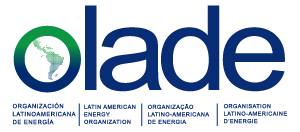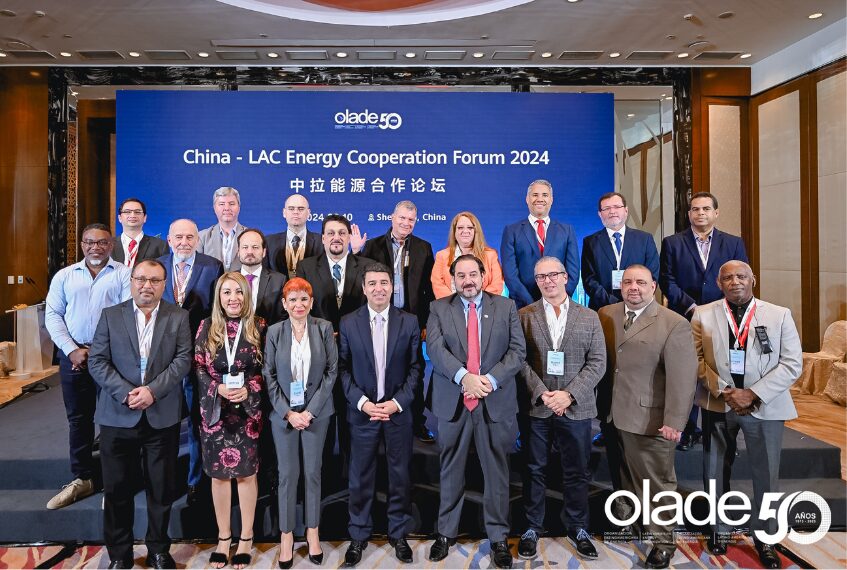This Tuesday, June 11, 2019, at the facilities of the Latin American Energy Organization (Olade) in Quito-Ecuador, the advances of the project: “Vulnerability to Climate Change and Adaptation Measures of Hydroelectric Systems in the Countries Andean “, which was developed since 2017, were presented. Among the advances shared, the analysis of the impact of Climate Change in the pilot basins of each of the countries involved in the study (Bolivia, Colombia, Ecuador, Peru and Venezuela) is highlighted.
The Executive Secretary of Olade, Alfonso Blanco, in his opening speech, thanked the support from the Inter-American Development Bank (IDB), for the financial support for the execution of these studies and the Olade and TECNALIA team, which are providing technical support in the realization of the project.
The Secretary explained that together with the IDB, this initiative has been started in order to work on the vulnerability and climate change issues of hydraulic systems, a process that has already been carried out in Central America, through the preparation of a document that has been completed and it will be presented officially by Olade-IDB. With the intention of evidencing the interest of both Organizations in disseminating these issues.
“Climate change is presenting important impacts in our electricity production systems, it is affecting all the capacity we have in terms of hydroelectric generation and this will have relevant effects at the level of our population and in economic aspects, related to the production of hydroelectricity “said the Executive Secretary of Olade, Alfonso Blanco, referring to the fact that environmental and social impacts are also evident, which is precisely the theme that this project focuses on, which has the purpose, in the first place, to generate awareness at the level of decision takers on the changes that are observed in the region.
Secondly, to leave elements of powerful and deep analysis for the Member Countries of Olade to obtain financing for adapting to these problems caused by climate change, since at the discretion of the Executive Secretary of Olade, this type of studies in some way generates a road map for each of the countries to identify which are the areas that need that adaptation to climate change. For this, he stressed that it is necessary to invest and generate projects that in some way mitigate the impacts of climate change.
The Executive Secretary of Olade, Alfonso Blanco, reiterated that the important thing is to socialize the results and advances of the project, at the level of study, which has been achieved for the Andean area and mentioned that the Organization’s expectation is to start a new phase for the Southern Cone, working on the large installed capacity in hydroelectric matters of the countries that make up this area.
“Our region in recent years has been decreasing slightly in this renewable energy index of our energy matrix. A region that was initially strongly conditioned by the participation of hydroelectricity and biomass from a strong electrification of demand, and even when we are incorporating renewable and unconventional energy sources into our energy matrix, in many of our countries of our region, in average terms, we are reducing that rate of renewability. This means that our energy demand is occurring at a higher rate than what is the incorporation of renewable sources, then we must also take it as a signal and an issue to be considered by our entire region.” Executive Secretary of Olade, Alfonso Blanco, explained this referring in general terms to the accumulated of the entire region, taking into account that there are some subregions that have gone through an inverse process, as is the case in Central America, that there is already an operational outlet for thermal power plants that have been replaced with renewable energy sources.
During part of his intervention, the Secretary, emphasized that hydroelectricity is a letter of presentation of the region to the rest of the world. “The use of water resources is part of the energy DNA of our region, it is a clear example of what regional integration has been based on large hydroelectric projects, many of them which have bi-national content, and have given the first steps in relation to regional integration,” he said.
The explanation of the technical aspects of the advances of the project was in charge of Jorge Paz, Specialist of TECNALIA, who presented the points that contemplated models and climatic scenarios, energetic of land use. In addition to the changes that would be generated with adaptation measures in contributing basins, infrastructure and in the energy system.
On the other hand, Manuel del Jesús, specialist IH-Cantabria, presented the projections on the impact of climate change on the operation of hydropower in the Andean region and hydrological models.
Data about the project
Since 2017, a consortium led by the TECNALIA Corporation has executed the consultancy with the Institute of Environmental Hydraulics of the University of Cantabria (Spain), the PSR company in Brazil and the Futuro Latinoamericano Foundation (Ecuador).
The project was composed of 6 phases:
-Data collection
-Regional analysis of Climate Change and diagnosis of energy supply
-Pilot studies in basins
– Cost benefit analysis of measures to adapt to climate change
– Development of methodologies and tools
– Capacity building.
During the first semester of this year the elaboration of the products of component III of the Project has been completed, which consist in the analysis of the impact of Climate Change in the pilot basins of each of the countries involved in the study (Bolivia, Colombia, Ecuador, Peru and Venezuela) and the selection of adaptation measures for these pilot basins.
Based on this selection of adaptation measures, the cost / benefit analysis of its implementation is carried out, which corresponds to component IV of the study, which simultaneously advances in the drafting of the report on development, calibration and validation of the replicable methodology (component V). Finally, progress is made in the organization of the capacity building workshop on said methodology and the presentation of final results (component VI).
With the purpose of evaluating the impact of climate change on the availability of the hydroenergy resource in the countries of the Andean Subregion (Bolivia, Colombia, Ecuador, Peru and Venezuela) and proposing adaptation measures to this phenomenon, Olade together with the financial support of the IDB, developed this project that seeks to analyze the relationships between the different components that make up the hydropower system in several Andean countries and develop projections about each of the components of the system.
Department of Communication
and Institutional Relations





